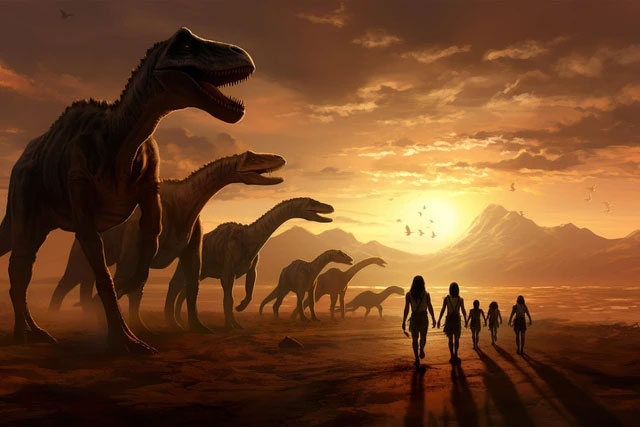Shocking Research: Dinosaurs Took 100 Years Off Human Lifespan
Humans might have lived to be 200 if not for a "lifespan bottleneck" event that happened to their ancestors.
A new study led by Dr João Pedro de Magalhães from the University of Brimingham (UK) shows that humans and many other ancestors have been stripped of some "longevity" genes.
According to Science Alert, this happened to the Eutherian mammal lineage, one of two branches of the mammal class that split off in the early Cretaceous or late Jurassic periods.

Although they did not coexist, dinosaurs indirectly affected human longevity by overwhelming the habitat of their ancestors - (Graphic image: SCITECH DAILY).
Eutheria is the ancestor of humans and countless other animals that exist today . Growing up in the "age of monsters" is extremely disadvantageous for this lineage.
"Some of the first mammals were forced to live at the bottom of the food chain and may have spent 100 million years during the age of dinosaurs evolving to survive through rapid reproduction," said Dr de Magalhães.
But they are forced to eliminate some of their precious " natural" genetic factors.
Among the things that were eliminated were enzymes that help repair damage caused by ultraviolet light. This also happened to marsupials, which were descendants of another lineage that lived alongside the Eutheria.
That, perhaps, is because they have to be more nocturnal to be safe. As a result, people today are forced to rely on sunscreen to prevent a host of problems, including skin cancer.
In addition, the gene that allows for multiple tooth replacements, which many reptiles possess, has been lost in mammals, so we are left with a set of teeth that deteriorates in middle age, and may eventually be lost altogether in old age.
Overall, many genes associated with longer lifespans, resistance to certain diseases, and maintaining health in old age have been eliminated in favor of survival.
These disadvantages led to an even more important benefit in the wild Cretaceous: Mammals had "leaner" genes, so they were able to mature quickly and reproduce more.
Thanks to that, they can use their large "population" to compensate for being hunted, destroyed, and overwhelmed by too many larger animals during the 100 million years they lived with dinosaurs.
Tiny but agile, mammals have survived the age of monsters, even surviving the "dinosaur extinction" 66 million years ago, albeit short-lived.
The research also helps to further understand the factors behind aging, paving the way for a series of studies in fighting age-related diseases, including dementia, stroke, higher risk of cancer than other species.
The results were recently published in the scientific journal BioEssays.
- Research reveals interesting facts about the maximum human lifespan
- Discovered a giant dinosaur skeleton that has a lifespan of 70 million years
- Detecting common ancestor fossils of humans and modern primates
- Female or male cats live longer?
- Death Clock – AI application that can predict human lifespan
- Can accurately predict human life expectancy
- Shocking research shows that: 3,000 years ago, the human brain shrank
- T-rex tyrant dinosaurs also know 'love' - the shocking study of scientists
- Arctic dinosaurs are only 20 years old
- 10 weird, hard to imagine dinosaurs
- Bacteria determine people's lifespan?
- Dinosaurs evolved into today's birds
 Discovered an ancient centipede fossil 99 million years old
Discovered an ancient centipede fossil 99 million years old Discovered bat-like dinosaurs in China
Discovered bat-like dinosaurs in China Discovered a 200-year-old bronze cannon of the coast
Discovered a 200-year-old bronze cannon of the coast Discover 305 million-year-old spider fossils
Discover 305 million-year-old spider fossils Why do we get older when cells are always replicating?
Why do we get older when cells are always replicating?  Rare 30,000-year-old skeleton reveals when ancient humans went through puberty
Rare 30,000-year-old skeleton reveals when ancient humans went through puberty  Giant clams live hundreds of years
Giant clams live hundreds of years  Find out the reason why more and more young people get cancer
Find out the reason why more and more young people get cancer  Research reveals interesting facts about the maximum human lifespan
Research reveals interesting facts about the maximum human lifespan  12-year-old prodigy graduates from university, proving Albert Einstein 'wrong'
12-year-old prodigy graduates from university, proving Albert Einstein 'wrong' 